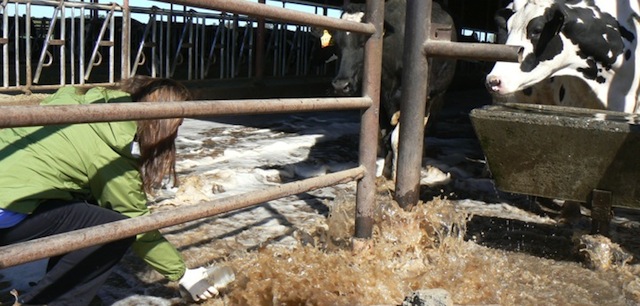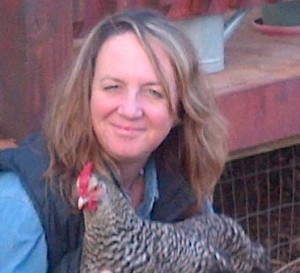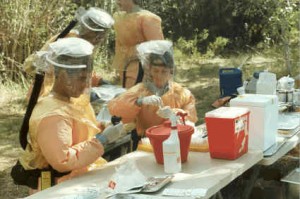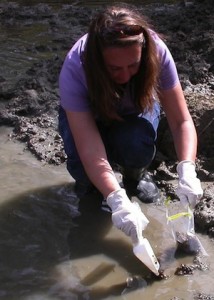UVP 002: Public Health and Food Safety Veterinarian Dr. Michele Jay-Russell


Thank you all for giving such a warm welcome to my first podcast episode a couple of weeks ago! The interview with Dr. Jonathan Epstein has been downloaded and viewed several hundred times already, and The Uncommon Veterinarian Podcast was even sitting on the front page of the Science & Medicine podcast category in iTunes for a few days.
Speaking of iTunes, you can find and subscribe to the podcast at this link. If you have a minute to leave some feedback with a rating and review there I would really appreciate your support.
This Week’s Guest: Dr. Michele Jay-Russell
 I’m excited to introduce public health and food safety veterinarian Dr. Michele Jay-Russell in this second episode of The Uncommon Veterinarian Podcast. I first got to know Dr. Jay-Russell through her Twitter handle, where I was immediately intrigued by the fun combination of relevant veterinary public health links and observations about her backyard chickens, goats, and bees.
I’m excited to introduce public health and food safety veterinarian Dr. Michele Jay-Russell in this second episode of The Uncommon Veterinarian Podcast. I first got to know Dr. Jay-Russell through her Twitter handle, where I was immediately intrigued by the fun combination of relevant veterinary public health links and observations about her backyard chickens, goats, and bees.
Dr. Jay-Russell is currently a program manager at the Western Center for Food Safety, which is an FDA Center of Excellence based at the University of California, Davis, that especially focuses on the produce industry. She also spent many years working in different roles in California’s public health system, starting in the Epidemiological Investigation Service and eventually being promoted to the role of State Public Health Veterinarian before moving back into academia to get her PhD.
I really enjoyed talking with Dr. Jay-Russell because she was willing to share very honestly about what her life and career have been like as a veterinarian in the public health arena. I know that a lot of veterinary schools are currently really encouraging their students to think about careers in public health, but a lot of vet students and even practicing vets might not have much exposure to real veterinarians who are actually out there working in these fields.
Links We Mentioned
 Masters of Preventive Veterinary Medicine at UCDavis: This is one of the oldest academic programs in veterinary public health in the world, and you’ll probably be surprised to see how many of the uncommon vets I interview have these four strange letters after their names (MPVM). It is restricted to graduate veterinarians and can be completed in one or two years. The photo here that you’ll also see on the “About” page is actually of Dr. Jay-Russell and a colleague from USAMRIID during the hantavirus investigation way back in 1993.
Masters of Preventive Veterinary Medicine at UCDavis: This is one of the oldest academic programs in veterinary public health in the world, and you’ll probably be surprised to see how many of the uncommon vets I interview have these four strange letters after their names (MPVM). It is restricted to graduate veterinarians and can be completed in one or two years. The photo here that you’ll also see on the “About” page is actually of Dr. Jay-Russell and a colleague from USAMRIID during the hantavirus investigation way back in 1993.
California Epidemiological Investigation Service: This is the training program that Dr. Jay-Russell participated in after a year in private practice that helped launch her into California’s state public health system. It has a similar set-up to the CDC’s national Epidemic Intelligence Service. Unfortunately it has seen a lot of budget cuts over the last few years, but the program still accepts some veterinarians every year. Check out Gaël Lamielle’s Global Health Vet website — he’s a 2009 graduate from Western who actually just started the program this year.
Dr. Jay-Russell also recommended that interested listeners check out the websites of the American Association of Public Health Veterinarians, the National Association of State Public Health Veterinarians, and the International Association for Food Protection.
What You Will Learn in This Episode
- specific salary estimates from Dr. Jay-Russell’s public health career
- advice for veterinary students about whether or not they should get clinical experience before venturing into public health
- why a food safety veterinarian has ended up working so frequently with wildlife
- what it was like going door-to-door collecting hamburger and fecal samples (bloody human diarrhea, anyone?) during an E. coli O157:H7 outbreak
- what it was like as a veterinarian to interview hospitalized AIDS patients about their life histories
- thoughts on the lifestyle differences and varying sources of stress for a veterinarian in public health versus clinical practice
- why Dr. Jay-Russell feels like her work is meaningful and has a significant impact in the world

Dr. Jay-Russell can be contacted on Twitter or by e-mail at mjay [at] ucdavis.edu. You can also get her expert opinion on cage free eggs on CNN, raw milk on Food Safety News, or a recent spinach outbreak on PBS. She would also love to respond to comments or questions here, so fire away!
Are you considering a career in veterinary public health or food safety? What do you need to know that will help give you some clarity in pursuing this idea?
The Interview
You can watch a video of our conversation here, or even better just continue to scroll to the bottom of this post for the audio podcast itself.
Your best option of all is to head on over to iTunes, subscribe to the podcast there, and leave some feedback while you’re at it.
Thanks for listening!
Podcast: Play in new window | Download | Embed

Comments
I’m considering pursuing a dual DVM/MPH degree, but I would like to know what percentage of time is actually spent hands-on with animals when working in the public sector. I work as a lab animal technician in academia currently and it seems like there are a lot of politics and paperwork involved and not much clinical interaction. I am particularly interested in food animal medicine, but less in epidemiology and more in environmental and nutritional health. Any thoughts?